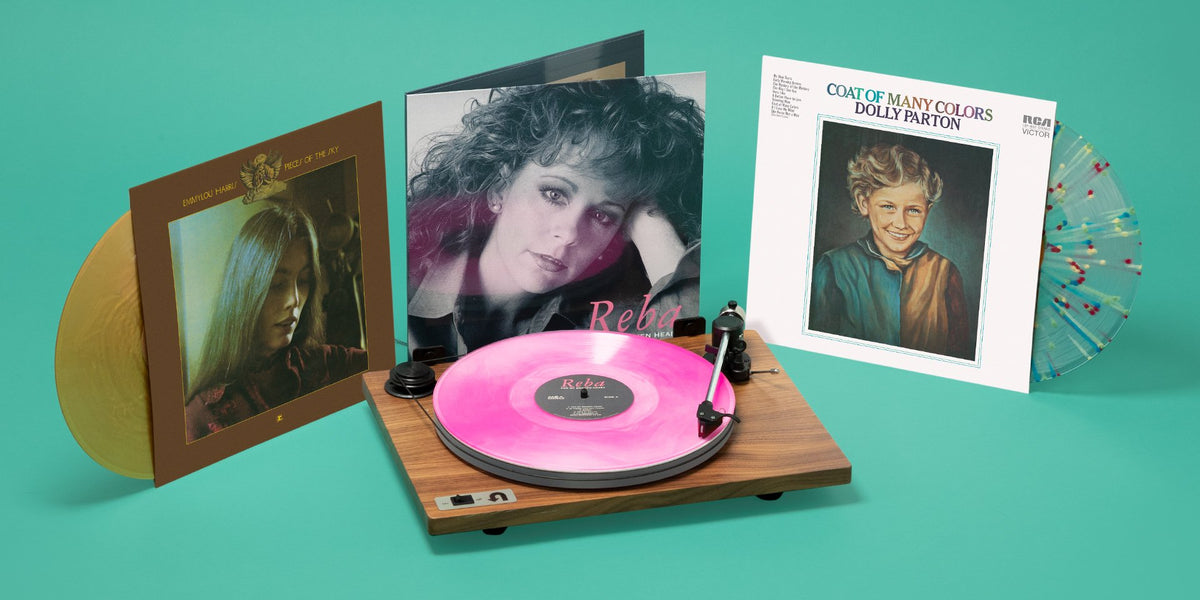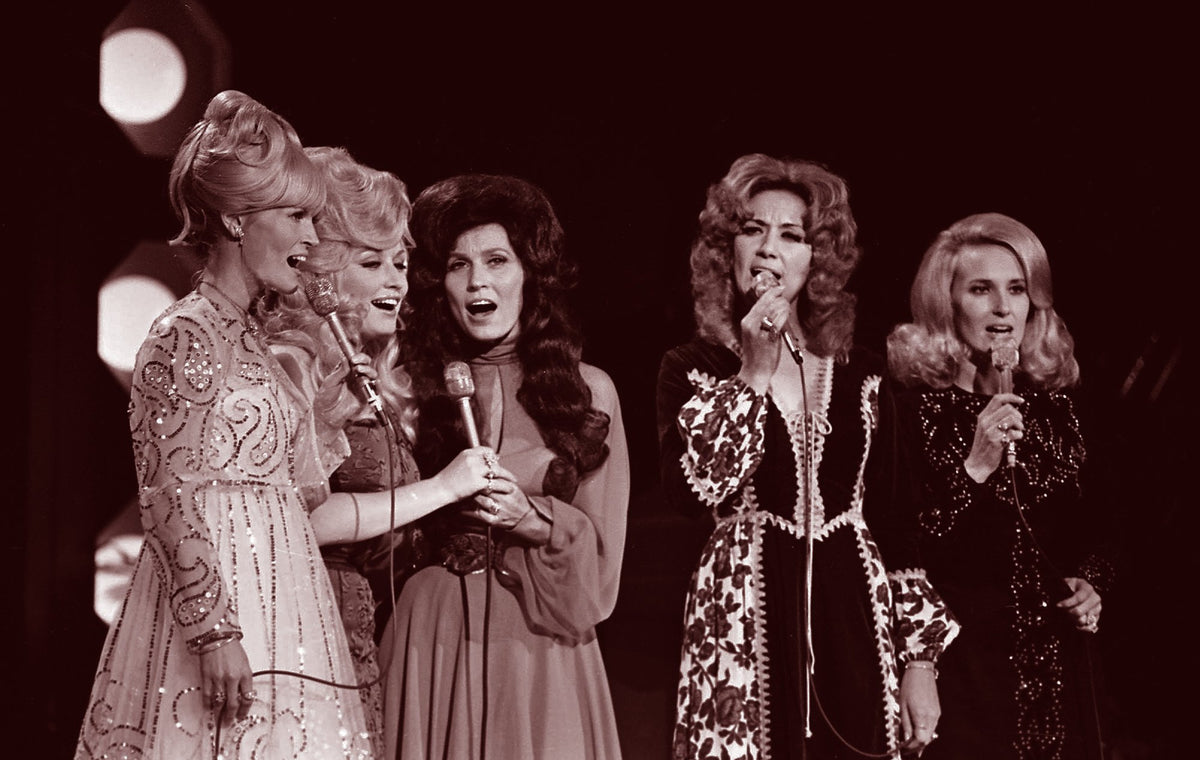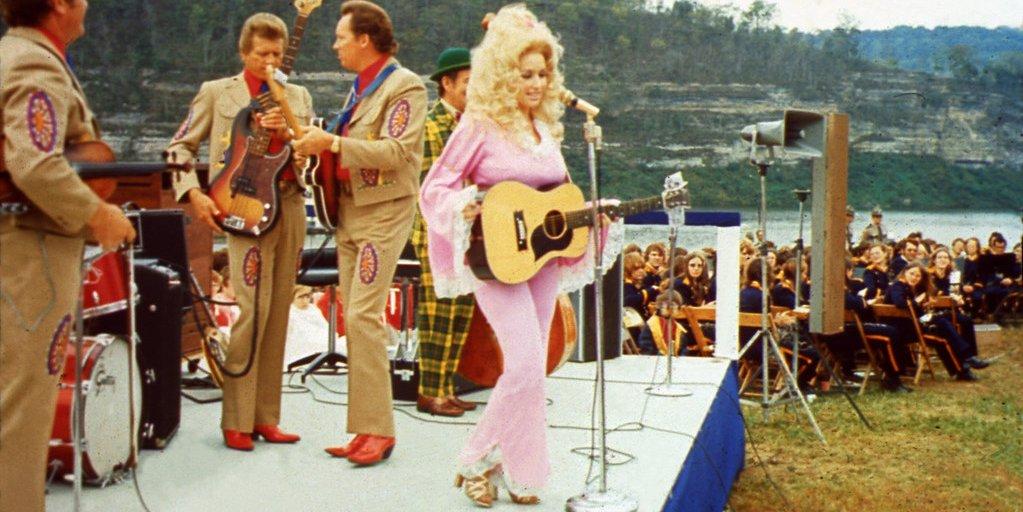Picking up the ‘Pieces of the Sky’
How Emmylou Harris Made her Solo Breakthrough in the Midst of Tragedy
“You have to grow up, start paying the rent and have your heart broken before you understand country.” — Emmylou Harris to The London Times, 2008
Spin Emmylou Harris’ breakthrough album, Pieces of the Sky, just once, and it’s tough to even imagine a voice as free as hers coming from someone who’s ever had a single reservation in her life.
But as a teenager in the early ’60s, Emmylou was concerned she didn’t have what it took to become a folk singer. On the one hand, she had all the trappings of someone who could grow into a great folk singer: She studied the songs of her hero, Joan Baez, as if her life depended on it, got herself an acoustic guitar — a Kay 1160 Deco Note that would one day end up on display in the Country Music Hall of Fame — and her unique aptitude for producing haunting vocals beyond her years was becoming more apparent by the day. There was just one problem standing in her way, she thought: She hadn’t suffered enough.
Born in Birmingham and eventually moving around North Carolina and Virginia throughout her childhood, Emmylou was a middle-class military brat. Save for a smattering of guitar calluses, her hands were pristine. She was a cheerleader, a crown-certified teen beauty queen on her way to becoming her graduating class’s valedictorian. Who was she, she wondered, with no experience and so few credentials, to make such utterly serious music? Such big, existential questions call for qualified answers, so she wrote a letter to Pete Seeger — several carefully handwritten pages, front and back, explaining her conundrum to one of the forefathers of American folk music.
“He wrote me back this letter that basically said: ‘Don’t worry about suffering, it’ll happen,’” she recalled later, in a 2004 BBC documentary about her life called Emmylou Harris: From a Deeper Well. But even the wise Pete Seeger himself couldn’t imagine the degree to which he’d be right.
After Harris hung up her valedictorian stole, she headed off to the University of North Carolina at Greensboro School of Music, Theatre and Dance on a drama scholarship with dreams of becoming an actress. Instead of finding herself in the theater or the classroom, like the rest of her peers, she spent all her free time gigging in bars, where she realized she could silence entire rooms of people with her voice. Eventually, and much to her parents’ chagrin, her underlying desire to become a folk singer became too much to bear, and she dropped out. Stuffy academia be damned; the American folk music revival’s peak in the ’60s saw Emmylou and Joan Baez reign over both Greenwich Village and the American airwaves, and Emmylou had every intention of being at the center of it. And besides, she deemed herself a “lousy actress,” and there was nothing else to do. So, in a plot point familiar to dreamers, she packed her bags and moved to New York City, playing in Greenwich Village coffeehouses whenever she could and waiting tables day after day to get by.
In 1969, at the age of 22, Emmylou married another budding young songwriter named Tom Slocum and made her first album. Gliding Bird is a folk record containing five Harris originals that are influenced by Joni Mitchell, plus a handful of covers. While it displayed the raw beginnings of the unique vocal prowess on which she’d one day build a career, her record label, Jubilee, declared bankruptcy shortly after its release, and the record flopped commercially. Not long after, she discovered she was pregnant (“the worst thing any girl could do to her budding career,” she later remarked). Just after the birth of their daughter, Hallie, in 1971, staring down a new mouth to feed and the steep costs of New York rent, Emmylou and Tom moved to Nashville with their marriage on the rocks. Soon, they divorced, and Emmylou was a single mom left to grind at various odd jobs, one day working as a cocktail waitress and the next as the (clothed) figure model for an art class, leaving little to no room for her music. No matter how hard she worked, the money just wasn’t enough, and on her first trip to the grocery store on food stamps, the only thing she purchased was baby food. Before the year was up, after only eight months struggling in Nashville, she packed up Hallie and moved to her parents’ place in Clarksville, Maryland.
With some newfound childcare aid from her parents, Emmylou took on various day jobs and was eventually able to quit them, one-by-one, to perform again at folk clubs in the area six nights a week. She was finally making enough money to skate by as a musician, but by now, she’d shelved her dreams of anything beyond spending all of her nights as a local club act. At this point, she certainly wasn’t into country music. She’d perform it “tongue in cheek,” and perhaps because it suited her voice, but she wanted to make folk music that “made statements and said something.” At the tail end of the Vietnam War and a time of great American division, she viewed country music as “right wing” and herself as a refined liberal. But Johnny, Dolly, Willie and Waylon were already shaking things up and flipping the script from the stale country of yesteryear, and little did Emmylou know she was next in line as a patron saint of Nashville — all thanks to Gram Parsons.
In 1971, members of the rising country rock band the Flying Burrito Brothers happened upon Harris performing in a club in D.C. Like many before them and even more after, they were mesmerized immediately by her voice and uncanny harmony abilities. They chewed on the idea of asking her to sing with them before recommending her to their former member, Gram Parsons, who was working on his debut solo project and searching for a female vocalist.
Despite any hesitation Emmylou had around country music, when Gram asked her to come sing on his record, GP, she said yes. Of course she said yes; she had a kid, needed the check and these were bigger names than anyone that’d ever come knocking on her door before. However, her hopes that this would lead to anything real were low; she’d heard every broken promise the music industry had to offer. She arrived at Wally Heider Studio 4 in Hollywood, California, to a team of bona fide rock stars, including two of Elvis Presley’s band members, guitarist James Burton and pianist Glen D. Hardin.
While GP flew under the radar following its release in 1973, the album seeded Parsons and Harris’ inimitable chemistry. Harris toured as a member of Parsons’ band, the Fallen Angels, and the pair stopped time in its tracks every time they took to the mic together. No longer was Emmylou just singing backup for Gram — she was an essential muscle of his music. They sang with their mics inches apart, face-to-face instead of turned toward the audience. If she first fell in love with the high of rendering a room speechless with her voice alone, then dueting with Gram was the whole damn eight ball and then some.
“For my money, they’re the greatest recorded duets in popular music; you don’t have to talk about just in country music,” Elvis Costello once said.
Every song they sang, her otherworldly, crystalline warble wrapped around his gruff, drawn-out growl. She was going to be the Tammy to his George, the Dolly to his Porter and the June to his Johnny. They were evolving to be next up in a long line of iconic country music male/female duet partners, and no one could argue they didn’t have the pure magic to pull it off. Even behind the scenes, on the road and in the studio, the two were perfect foils: Emmylou, soft-spoken, angelic and relatively mild-mannered for a blossoming rock star; and Gram, explosive in every sense of the word and constantly under the influence. Phil Kaufman, their road manager, chuckles in the BBC documentary remembering their time on the road: “Emmylou was knitting, Gram was drinking, Emmylou was knitting, Gram was drinking.”
But it was also on the bus with Gram that Emmylou started warming up to (and even falling in love with) country music, no longer predominately seeing it as simply a means to a check. While he’d hoped his progressive country rock — or “cosmic American music,” as he preferred — would resonate far beyond the traditional country audience and turn people on to the power of the genre, Gram’s biggest impact was, perhaps, converting his own singing partner above anyone else. “I hadn’t really heard [country]. I couldn’t get past the layers and country music being politically incorrect,” Emmylou remembers. “Gram did bring the whole rock sensibility — not just the attitude and lyrics, but the whole culture — into this other culture.” He played Charley Pride and Merle Haggard and George Jones, and she soaked up every minute of it. “I was really ripe and I realized the beauty of the simplicity of country music — to get across the truth and the emotion of what you’re trying to do, and that’s the real challenge in country music.”
Over time, they grew the kind of personal and creative vision and connection that even the luckiest artists can only dream of. They were on an impossibly upward trajectory, the brightest burning stars in the sky, when Gram died of an overdose at age 26 in room eight of the Joshua Tree Inn on September 19, 1973.
Emmylou was destroyed — “Staring right into the abyss,” as her longtime friend and creative collaborator Linda Ronstadt recalled.
“A couple of weeks before he died, I’d finally accepted the fact that I was in love with him. But, you know, why even tell him? I was going to see him in a few weeks. I had all the time in the world. And then he died, so I never even got to tell him. I was savouring the moment. I didn’t want to say it over the phone. I wanted to say it to him in person. But I never had the chance.” Emmylou’s long been hesitant to openly discuss Gram’s death or their relationship, but spoke on the matter in a 2018 interview with The Guardian.
On top of the horror and pain of losing her beloved Gram, gone too was everything they were supposed to create together, a future consisting of night after night together on stage and in the studio making untouchable songs and changing the course of country music. She seemingly would’ve been content being Gram’s sidekick on stage until the end of eternity, but now, if she wanted to fulfill their vision and finish what he started, she’d have to do it herself — thrusting her into the solo spotlight in the midst of her grief. To honor Gram and to honor herself, she decided to pick up the pieces and make Pieces of the Sky.
“I was definitely gathering up everything that Gram had touched like they were holy relics,” Emmylou said. “I had just started to find my musical identity and my voice, but it was so closely associated with what he was doing. Then I was left in the lurch, so I figured, ‘OK, Gram picked this band to record with him, so they must be an important part of it.’”
Pieces of the Sky was recorded at the Enactron Truck in Los Angeles, California, and Track Recorders in Silver Spring, Maryland. Eventually dubbed “The Hot Band,” Emmylou made her record with James Burton on guitar and Glen D. Hardin on keys. Alongside them was Byron Berline on fiddle, Ray Pohlman on bass and Ron Tutt on drums. It was produced and engineered by Canadian producer Brian Ahern, who’d later become Emmylou’s husband and the father of her second daughter.
Despite all the anguish enveloped in its circumstances, the album opens with pleasure. “Bluebird Wine,” the first of many Rodney Crowell songs Emmylou would go on to cut, is a darling, folksy bluegrass barnburner. It’s about settling down with a lover and giving up your old wild ways and not missing a damn thing. When the song’s narrator finds themself madly in love, they realize they’re drinking out of joy instead of out of pain. When Emmylou sings it — her open-toned zealousness all the way through, the way her ethereal ghost of a voice materializes as it aggressively slides into the key change — it’s tough not to hear it like a fantasy that could’ve been.
Much of the album consists of covers and country standards reimagined and reinvented by Emmylou’s — and Gram’s — progressive vision. She was rewriting country the way Gram had rewritten it for her while respectfully honoring the past. She took a long-phrased and gentle approach to Dolly Parton’s “Coat of Many Colors,” put a plaintive spin on Merle Haggard’s “The Bottle Let Me Down” and even managed to blow up The Beatles’ “For No One” and refasten its remains into a bone-chilling country ballad for the ages. Her cover of The Louvin Brothers’ “If I Could Only Win Your Love,” a mandolin-centric duet with Herb Pedersen, features cheek-warming harmonies as full-bodied as a good cabernet and was an immediate hit on the charts.
The only song on the album that Emmylou has a songwriting credit on, and one of a handful of songs that she wrote in her early career that made it onto her records, is the album’s undeniable centerpiece, “Boulder to Birmingham.” The song is an outpouring of her grief, written following Gram’s passing. It begs and pleads and bargains and reckons with one goal in mind: seeing her lost love’s face just one more time. The sparseness of the intro, the faint, tearful ghost of the pedal steel, the way the chorus explodes into an avalanche of choral harmony that feels like a sob you’ve been holding back too long. It’s loss embodied — enough to knock the wind right out of your lungs, whether it’s your first listen or your thousandth.
After its release in 1975, Pieces of the Sky reached No. 7 on the Billboard Country charts and launched her solo career into the sun, far beyond what she’d ever seen in her short time performing and recording with Gram. And there Emmylou Harris was, at the top, holding everything made from less than nothing, all born out of suffering.
Amileah Sutliff is a New York-based writer, editor and creative producer and an editor of the book The Best Record Stores in the United States.
Related Articles
Join the Club!
Join Now, Starting at $36Pages







